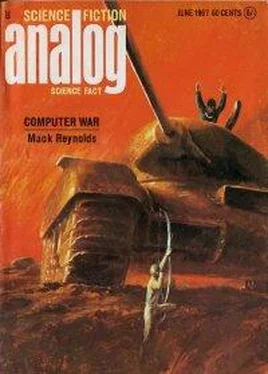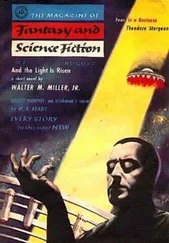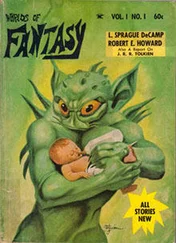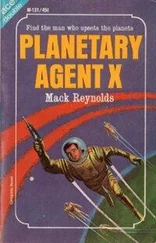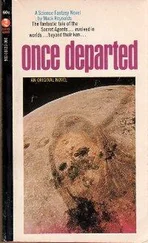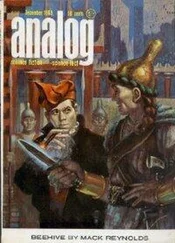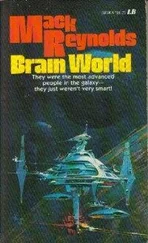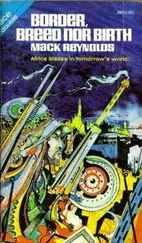Combs said ungraciously, “Very little.”
The Temple Monk looked about the mess table, noted that there were no clean cups and took up a dirty one. He began to fill it, saying, “Then that makes two of us, eh?”
“What was that?”
“Ummm. Haven’t you ever heard the old saying that the more one knows of one’s religion, the less one believes?”
Combs was, on the face of it, taken aback. He stuttered indignantly. “If you’re saying what I think you’re saying, then why not get out of that costume you’re wearing?”
The older man laughed at him. “My dear boy, look who’s talking. Your own costume isn’t exactly the uniform of the country you serve, is it?”
“I’m a guerrilla!”
Pater Riggin raised shaggy eyebrows. Then gesturing with his full cup at them all, said, “And so, I suppose, in a way, am I.”
Tilly had come up smiling and had stood silently thus far on the sidelines of the discussion.
She said to Combs, “Knock it, sour-puss. Boys, meet the longest-time guerrilla of us all.” She twisted her mouth in her mocking moue. “The espionage agent, the saboteur, the underground operative to shame the most competent.”
In his few years in the Central Comita, Ross Westley had seen Pater Riggin on a few occasions, and even exchanged amenities with him, but although the Temple Monk was well whispered about in innermost party circles, he had never come to know the man more than in passing. The alter ego of Number One; the man behind the throne; the Svengali to the Presidor’s Trilby; the only friend before whom the dictator let down his hair. All this he had heard Pater Riggin called, but he had found no evidence to back the charges.
But now this. The Temple Monk in the camp of the enemy, and obviously well-known to some, welcome by all, save possibly the junior officer Combs, a surly one at best.
Ross said, “What in the name of the Holy Ultimate are you doing here?”
Pater Riggin, his cup in his left hand, patted his tummy with his right, like nothing so much as a jovial Santa Claus. “I might ask you the same, Coaid Deputy.”
Tilly said, “I’m afraid that handle no longer quite fits Rossie. We had to pull a cloak and dagger rescue.”
Ross, still confused, snapped, ” I am not so sure it was a rescue. When my hearing came up, I would have had my say.”
The one called Altshuler laughed lowly.
Tilly tilted her head and looked up at the deposed propaganda head. “Rossie, Rossie. There was to be no hearing. You were on your way to be shot.”
A chill went through him, but he demanded, “How do you know?”
Most of those present, now crowded around the table, laughed. They seemed to do a great deal of laughing and joking, Ross realized impatiently. Was it a characteristic of those continually in extreme danger? A bravado brought on by the proximity of death?
Tilly said, mocking, “How did we know where you were and that you’d be passing that exact spot where we picked you away from Fielder’s Surety men, lover-mine? Let me give you an idea of just how well we are worked into the fabric of Alphaland. It was Jet Pirincin, who sits immediately outside your private offices; who smelled a rat when she saw you leave with the Temple Bishop. She relayed the message. So we got in contact with one of our other inside people, in Surety, who was able to get the details of what was to happen to you, and where. So, deciding that even though Alphaland might think you expendable, Betastan didn’t, we jumped on our horses and dashed off in all directions to the rescue.”
Ross was staring at her.
“You mean to tell me that Jet Pirincin is a Betastani agent? And that you also have them planted in the other commissariats in such Surety spots?”
“Certainly not,” she said.
“Then what do you mean?”
“Jet Pirincin, my dear Rossie, is a most patriotic citizen of Alphaland. She—”
He interrupted her, blurting, “You don’t make any sense at all.”
“She’s a Karlist.”
He held a long silence, then finally turned to look at Pater Riggin who had been beaming away, all the while sipping his coffee.
“And so are you!” Ross accused.
The Temple Monk nodded.
Ross turned on Tilly, then shot his eyes to Combs and around at the others. Most of them were grinning and eying him expectantly, though he couldn’t think why that should be in their expressions.
It came to his lips before it was fully comprehended in his mind. “So are the rest of you!”
The Temple Monk put down his empty cup. He sighed and said, “Let us be seated. I am sure we’ve all been through a great deal in the past hours. However, there is no opportunity for much rest, and we’re even short of time for explanation.”
He took his own advice and utilized one of the benches that ran along the mess table. Six or eight of the others, including Ross, Tilly and Combs, seated themselves as well, but the others remained standing.
Pater Riggin brought his eyes back to Ross and said, “My son, you do not suppress an ideal by butchering its adherents, unless you are in position to liquidate them all. Even then it may germinate among others. This most certainly applies to social systems. Decimate the adherents enough and they will go underground, perhaps, but the teachings remain—be they right or wrong—and will hibernate until opportunity presents itself again to make a bid for realization.”
“Then in spite of Number One’s efforts for the past half century, the Karlist movement remained in existence, underground?” Ross asked.
“Correct.”
Ross looked at Tilly, scowling. “But what’s this got to do with the extent to which you Betastani have infiltrated Alphaland?”
“Don’t be dense, Rossie. Had we been limited to signing up Alphaland traitors and buying the money-hungry, we would have had a small underground indeed. But when we were able to gain the cooperation of a whole socioeconomic movement, comparatively small though its membership might be, we had on our side an organization of dedicated idealists. And that you can’t beat when you’re in the clutch, Rossie mine.”
Then you’re all, all damned Karlists!” he snapped.
Pater Riggin put back his rounded head and laughed.
“My son, my son. Please remember that I lived through the civil war, heard the slogans, even helped write the diatribes against the movement. Sat at the side when the leaders, some of whom were long-time friends, were tried and shot. Participated through it all as an active anti-Karlist.”
“But you just said…”
The older man held up a hand. “To my shame and sorrow, it was not until later that I was able to rise above the slogan level and actually investigate the teachings of these people. It was then that I became converted—much too late to have got myself shot as an adherent.”
Ross was scowling at the Temple Monk. From the side of his eyes, he could see Tilly Trice watching him intently with an element of worry there. This was apparently of the greatest importance to Tilly. He refused to consider the obvious reason why.
Pater Riggin was more serious now.
“Ross Westley, most great beliefs, ideals, can be summed up in a sentence or two. If they need more, then there is a weakness, the belief is not whole. So then, in your own words, tell me what you think the basic teaching of the Karlists is?”
Ross looked at him. All his life, since he had been a child at the knee of the passionate Franklin Westley, he had been subjected to the anti-Karlist teachings. In these, his later years, he had even participated in spreading them. Long, supposedly, after the Karlists had been a danger.
Anti-Karlism was a dogma, a faith, he knew. Decades past, the adherents of Number One had dug out every last book or pamphlet written by that organization’s leaders and had burned them. Every novel, ever so lightly tinged, every play, or even verse, that could be accused of Karlist leanings—all were destroyed. It came to him now that he, Deputy of Information, had never actually read a true Karlist book or article. Oh yes, books on socioeconomics which had quoted in limited amounts from this work or that, the better to criticize and condemn the movement, but the basic works of the enemy? He didn’t know, but he doubted if even Number One had them in his private library. Or even Mark Fielder.
Читать дальше
